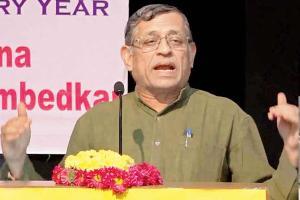Gurumurthy's problem is a press that asks too many questions, but now, more than ever, we must be vigilant against his disruptive ideas

Gurumurthy recently gave a lecture at the right-wing Vivekananda International Foundation in Delhi suggesting, among other things, that the RBI hand over the printing of money to the government. file pic
 Reserve Bank of India (RBI) non-executive director S Gurumurthy is a known Muslim-baiter, but I wouldn't be surprised if he secretly admired Saudi Crown Prince Mohd bin Salman.
Reserve Bank of India (RBI) non-executive director S Gurumurthy is a known Muslim-baiter, but I wouldn't be surprised if he secretly admired Saudi Crown Prince Mohd bin Salman.
After all MBS, as he's known (and lately as Mr Bone Saw), is suspected to have ordered the murder of dissident journalist Jamal Khashoggi, a suspicion confirmed by the USA's Central Intelligence Agency (CIA) recently. The CIA told US lawmakers in closed hearings it had phone conversations between an MBS aide and one of the 15 on the assassination team at the Saudi consulate in Istanbul, Turkey, on September 28 (Khashoggi went there for the paperwork needed to marry his girlfriend). MBS himself telephoned a suspect in the lead-up to the assassination.
Gurumurthy's contribution to India so far has been convincing Prime Minister Narendra Modi to inflict the demonetisation of high-denomination currency on November 8, 2016, that achieved none of the aims our strongman leader laid out in his televised address. Gurumurthy now wants the RBI to hand over to the government, which is facing a payments crisis, Rs 3.6 lakh crore of its reserve to bail out Non-Banking Financial Companies (NBFCs), which have since September gone into a liquidity crisis.
The RBI already has the headache of recapitalising public sector banks which are saddled with around Rs 10 lakh crore in bad loans (or Non-Performing Assets). He recently gave a lecture at the right-wing Vivekananda International Foundation in Delhi suggesting, among other things, that the RBI hand over the printing of money to the government. This is a guaranteed prescription for hyper-inflation like Germany had in the 1920s, or Venezuela and Zimbabwe have had recently.
Gurumurthy's (and Modi's) problem is a press that asks too many questions instead of merely praising the strong leadership, Soviet-era style. They might have watched, in dismay, British Prime Minister Theresa May's press conference on Thursday. The way she visibly fell apart was cringe-worthy, relentlessly interrogated by a polite but persistent press. Her problem is Brexit; in 2016 the British public voted to leave the European Union, egged on by nativists like the UK Independence Party and members of May's own Conservative Party.
It is easy to suggest disruption (demonetisation, Brexit) but as May has found, it is difficult to actually implement it, especially when the deadline is March 29, 2019. She announced the details of her Brexit plan last week and it was greeted by three ministerial resignations (including her Brexit negotiator, of all people) and hoots of laughter by her backbenchers in Parliament. The press smelt blood and showed no mercy; no PM has looked so fragile on global TV. She won't last long, and will probably be replaced by a Brexit hardliner in her party, if not a strongman leader like many others around the world have these days.
Gurumurthy gets his share of fawning by India's media, which has lost the art of journalism since May 2014. A prominent anchor tweeted last week: "Heard @sgurumurthy
today at a speech in Delhi. Man of high intellect and supreme conviction. His take on what's wrong with the banking system in India is interesting and intriguing." This obsequiousness makes the Indian media deserve the abuse it gets. The tweet is wrong: Gurumurthy is low intellect, and his speech on YouTube shows that all he prescribes is voodoo economics, based on woolly ideas from ancient India and justified by the globe's economic mismanagement since 2008. Two wrongs do not make a right. And just because you call something intriguing does not make is less of a fantasy.
Gurumurthy and Modi know that it is impossible to assassinate journalists in India the way MBS had Khashoggi killed, but at the very least they would like to emulate US President Donald Trump (who has hinted that he was not inclined to believe the CIA's findings on the Khashoggi killing, incredibly) - in particular the way Trump quarrelled with CNN reporter Jim Acosta, whose press access to the White House was withdrawn. No doubt Modi has already gone halfway by refusing the speak to the press at all. Unlike Trump, he avoids press conferences and unscripted interviews; our spineless media - or the vulnerable owners - allow Modi to get away with it.
Ideally, Modi and Gurumurthy would like to shut all journalists out from any government reporting, making the media dependent solely on stodgy handouts instead. A judge last week restored Acosta's access, pointing out that the White House did not give the court any reason for ejecting the reporter. It's always easy to throw someone out, or to leave an economic community, or call for the disruption of an unsatisfactory economy, but it's never easy to follow through with a logical plan. Now, more than ever, India needs its media to remain vigilant against another big, disruptive idea from S Gurumurthy.
Aditya Sinha's latest book, The Spy Chronicles: RAW, ISI and the Illusion of Peace, co-written with AS Dulat and Asad Durrani, is available now. He tweets @autumnshade Send your feedback to mailbag@mid-day.com
Catch up on all the latest Mumbai news, crime news, current affairs, and also a complete guide on Mumbai from food to things to do and events across the city here. Also download the new mid-day Android and iOS apps to get latest updates
 Subscribe today by clicking the link and stay updated with the latest news!" Click here!
Subscribe today by clicking the link and stay updated with the latest news!" Click here!







